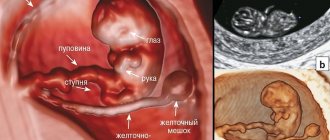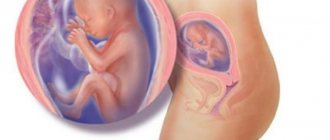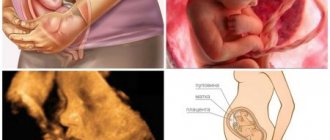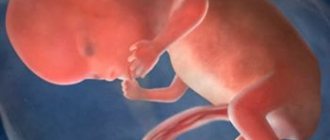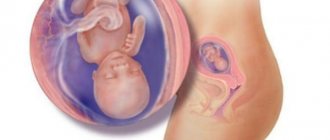- 16th week of pregnancy - how many months?
- Feel
- Ultrasound
- Fetus
- Analyzes
- Pain
- Uterus
- Stomach
- Discharge
- Sex
- Weight and nutrition
- Frozen pregnancy
16th week of pregnancy - how many months?
According to the obstetric calendar, the 16th week of pregnancy falls in the fourth month of a woman’s “interesting situation.” The second trimester is in full swing, and if everything goes as usual, the woman blossoms more and more and continues to prepare for the inevitable motherhood.
Feel
Feelings at the 16th week of pregnancy, if it proceeds favorably and in accordance with all norms, are not overshadowed by any painful or unpleasant manifestations. Toxicosis is a thing of the past, and so is frequent urination. The breasts, preparing for lactation, continue to enlarge, but the pain, as a rule, already disappears. Against this background, the expectant mother seems to “come to life”: the hormonal background has established itself in comparison with the early stages of pregnancy, therefore the woman becomes balanced and calmer, full of new strength and joy.
Starting from the 16th week of pregnancy, a woman often begins to feel her appetite increase. This is especially true for those mothers who initially suffered from toxicosis: now is the time to catch up on “lost time” and eat tasty and nutritious food, but at the same time keeping an eye on your weight.
It’s surprising, but at the same time pleasant, that the sensations at 16 weeks of pregnancy can be enriched by the first movements of a very tiny baby. Women who are pregnant again are more likely to feel the first movements of the baby: fetal movements in this case often occur 2-4 weeks earlier than during the first pregnancy. Often, the expectant mother at first does not even realize that these were the very first tangible movements of her beloved child: many women compare them with a slight flutter or sensation from air bubbles.
But, even if mommy listens sensitively to her feelings, but still doesn’t feel any movements, you shouldn’t be upset about this. After all, some mothers have a more active baby, some have a calmer one, even in the same woman, in different pregnancies, the babies begin to noticeably move differently.
Ultrasound
But, even if the woman does not yet feel the movements of the fetus, she can observe them during an ultrasound at the 16th week of pregnancy. When conducting an ultrasound examination, you can clearly see on the monitor how the baby moves, and even complements his movements with active grimacing. An ultrasound at the 16th week of pregnancy will show: the baby’s facial expressions are unusually active - the baby is already frowning, grimacing, winking. And, besides, it becomes clear who is “making faces” in the mother’s tummy: an ultrasound at 16 weeks of pregnancy is quite capable of determining the sex of the baby.
How you feel
During the 15th – 16th week of pregnancy, the uterus grows and stretches the muscles and ligaments in the lower abdomen, which is why you may feel minor pain. Now the uterus has grown so much that it can already be felt: to do this, empty your bladder, lie on your back and relax. Now try using your fingertips to gently explore the area in the middle of your abdomen, just above your pelvic bone. The protruding area is your unborn child. If nothing works and you cannot feel the uterus, ask your doctor to teach you how to do it correctly.
At the 16th week of pregnancy, due to compression of the intestines, problems with going to the toilet “in a big way” may appear. If we were talking only about discomfort, it would not be so scary, but prolonged constipation can increase the risk of miscarriage. Therefore, it is imperative to review your diet and include foods that have a laxative effect. To prevent problems with peristalsis in the 15th – 16th week of pregnancy, it is advisable to do simple physical exercises every day and walk in the fresh air, and it’s also a good idea to visit the pool.
Your breasts continue to enlarge and your areolas become even larger and darker. The hormonal surge has ended and your appetite has increased. However, you must try not to overeat and constantly monitor your body weight. Normal weekly weight gain ranges from 300 to 500 g.
And at the stage of 15 - 16 weeks of pregnancy, your temperature may increase by 1 - 2 degrees. There is no need to worry: the body “overheats” due to intense work, and with the help of increased sweating and a feeling of heat, the body cools itself. The amount of vaginal discharge may also increase. Increased secretion is a kind of preparation of the genital tract for childbirth.
In general, the 16th week of pregnancy is a period when a woman’s emotional state normalizes and her energy returns. A thirst for vigorous activity appears: you want to start renovations, large-scale shopping, or even moving. But the expectant mother should be careful - not to lift weights and not to overwork, because this can negatively affect the health of her baby.
Fetus at 16 weeks of gestation
Whether it is a boy or a girl, the fetus at the 16th week of pregnancy already reaches a “decent” size: it is 11 cm in length from the coccyx to the crown of the head, weighing about 100-120 g.
The baby's bones continue to strengthen - the legs become more developed, the nails are almost completely formed. The baby already holds his neck straight and can turn his head from side to side. At the same time, the ears and eyes are getting closer and closer to their “designated” location.
The baby’s heart works at its maximum, pumping up to 25 liters of blood every day. Digestive functions are now performed by the liver, which was previously responsible for hematopoiesis. But gradually the stomach, and with it the intestines and gall bladder, begin to function, while still only carrying out “training” work. In the intestines of the fetus, for example, the first contents appear, which for now consists almost of bile. This is original feces, meconium, which has a dark green or black-green color. Both the baby’s kidneys and bladder are already fulfilling their purpose: the fetus urinates every 45 minutes.
From now on, the baby’s bone marrow is responsible for hematopoiesis, and the composition of the blood is also fully formed. Now it is characterized by all those cells that are in the blood of an adult, the blood type and Rh factor of the fetus are determined. At the same time, there is still a place in the blood for a special substance called fetal hemoglobin, or hemoglobin of newborns. However, ordinary hemoglobin is already beginning to appear in the blood, but it will completely replace fetal hemoglobin only six months after the baby is born.
Medical examinations
A blood test as part of the second pregnancy screening will help identify the risk of having a child with developmental anomalies.
Before a scheduled visit to the doctor, you, as usual, take urine samples for analysis. At the appointment, the doctor weighs the patient, measures blood pressure, determines the height of the uterine fundus, and evaluates the result of a urine test.
This week, in addition to the standard examination by a gynecologist, expectant mothers undergo a second prenatal screening. Its timing is 16–18 weeks of pregnancy. Mom donates blood from a vein, and the following indicators are assessed in the laboratory:
- α-fetoprotein;
- hCG (human chorionic gonadotropin);
- unbound estriol.
This examination allows us to identify the likelihood of developing up to 40 different fetal malformations and chromosomal abnormalities. If the level of these biochemical blood components does not correspond to the norm for this period of gestation, ultrasound and additional procedures are prescribed. Only on the basis of a more in-depth examination can the diagnosis be confirmed or refuted. So, with the consent of the expectant mother, an amniocentesis procedure can be performed. It involves taking a sample of amniotic fluid from the amniotic sac for detailed study in the laboratory. The results obtained are considered reliable. However, amniocentesis is considered a complex procedure and carries certain risks for the fetus. Taking samples requires a puncture of the amniotic sac, which can subsequently lead to pregnancy complications and even miscarriage. True, many experts are inclined to believe that such unfavorable consequences are caused not by the procedure itself, but by existing pathologies in the baby’s development. A woman has the right to refuse the procedure.
Ultrasound
The outline of the baby is clearly visible on an ultrasound.
At this time, during an ultrasound, it is possible to determine the condition of the cervix, evaluate the structure of the uterus, and exclude or identify symptoms of a threatened miscarriage. The doctor will examine the umbilical cord, placenta, and perform Doppler measurements (a procedure that allows you to assess the quality of blood flow between mother and baby).
The fetus at this stage is already fully formed, but its organs and systems continue to develop. Using an ultrasound, the doctor examines the anatomical structure of the fetus and makes the following measurements:
- BPR (biparietal head size, from temple to temple) – normally 26–56 mm;
- DBL (femur length) - normally 13–38 mm;
- KDP (humerus length) - normally 13–36 mm;
- HC (head circumference) is normally 112–186 mm.
At the 16th week of my second pregnancy, I was in for some excitement. The fact is that the results of the first screening blood tests revealed some abnormalities. They became known only at this stage, since they took some time to carry out. The gynecologist didn’t really explain anything, she just said that some of the indicators were above normal. Moreover, as far as I understand, the risk of pathology in a child would be at a reduced level. Accordingly, she directed me to take a blood test again and issued a coupon for an unscheduled ultrasound. A friend had a similar situation at the same period, and to dismiss any concerns, she took a fetal DNA test. It is not cheap, but it is reliable and accurately shows the gender of the baby. During the ultrasound procedure, I tried to find out from the diagnostician whether everything was okay with the baby. The doctor was taciturn, she only said that the uterus was in good shape. To my question about the gender of the fetus, she could not give a definite answer, citing the fact that the baby was turned with his butt towards the sensor. However, then she still said: “it looks like a girl.” I already had an older daughter, and I didn’t exactly dream of a boy or a girl, but I wanted to know who to expect. So, with the results of the ultrasound, I returned to the gynecologist. The doctor insisted on hospitalization because of the tone of the uterus, but I wrote a refusal to be hospitalized. My health was normal, I did not feel any pain or discomfort, although the doctor warned that this condition may be asymptomatic. The results of the second screening were normal, and I calmed down. By the way, closer to 20 weeks, I had an ultrasound done for a fee at a medical center, where they showed me a boy on the screen, but no uterine tone was detected. I deliberately did not do a free ultrasound at the antenatal clinic in order to obtain more reliable data. In addition, my husband and daughter went with me to the procedure, who were able to see the future family member on a separate monitor, and then received a photo of the fetus as a souvenir. It is unclear whether the discrepancies in ultrasound results are due to the lack of professionalism of the doctor in the antenatal clinic or to difficulties with visualization. The result of my pregnancy was a healthy boy born on time.
Analyzes
Week 16 is a crucial period for a woman who now faces a slightly expanded list of tests. In addition to traditional urine tests, blood pressure measurements, weight control, and listening to the fetal heart, tests at 16 weeks are also desirable, which will detect or refute the presence of severe defects in fetal development. More precisely, one test: a blood test that allows you to assess the levels of alpha-fetoprotein (AFP), human chorionic gonadotropin (hCG) and unconjugated estriol (NE) in a woman’s body.
A study of the levels of these substances in the body of a pregnant woman makes it possible with a high degree of probability to assume the presence of chromosomal abnormalities and gross developmental defects in the fetus. Thus, deviations of AFP, hCG and NE values from the norm may indicate the possibility that the baby may have Down syndrome, cranial hernia, anencephaly, or spinal malformation. However, unfavorable tests at the 16th week of pregnancy can in no case be a reason for making a final diagnosis, but they become a good reason for additional studies and tests. For example, for amniocentesis.
Amniocentesis is an examination that involves taking a sample of amniotic fluid to study its composition. Analysis of amniotic fluid, the puncture of which is taken by inserting a needle into the uterus under ultrasound control, makes it possible to diagnose about 40 congenital malformations. At the same time, amniocentesis can provoke quite serious complications of pregnancy - up to its termination and premature birth. Therefore, this test should be carried out exclusively by a highly qualified specialist, having explained to the woman all the dangers of the procedure the day before. A woman, in turn, can always refuse such a procedure if she wishes.
16 week pregnancy video
16 week pregnancy photo
Pain
Despite the fact that toxicosis has already passed by the 16th week of pregnancy, and in general the woman feels much better in the first weeks of pregnancy, some painful sensations can sometimes still bother her. For example, complaints of pain in the lower back at 16 weeks are common. As a rule, they arise due to the increased load on the spine of the expectant mother. Considering this, you should give up heels and, if possible, give your spine a rest as often as possible. It is also a good idea to choose a suitable sleeping position. It is now a priori impossible to sleep on your stomach - pressure on the stomach must be avoided. But now you can’t sleep much on your back either: this position can cause pain in the lower back at 16 weeks. From now on, the most preferable position for sleeping is on the left side, with one knee slightly pulled up to the chest.
Uterus
At 16 weeks of pregnancy, the uterus continues to increase due to the constant growth of the fetus: now its weight can reach 250 g. During an examination, the doctor always measures the height of the uterus, which at 16 weeks already reaches half the distance to the navel. Such measurements are necessary to ensure the normal course of pregnancy and the normal development of the fetus. A woman can also feel the “house” of her baby: the uterus at 16 weeks of pregnancy can be felt approximately 7-7.5 cm below the navel. Gradually increasing in size, the uterus inevitably begins to put pressure on the intestines, which can provoke bloating, heartburn and constipation.
Belly at 16 weeks of pregnancy
Along with the enlargement of the uterus, the belly also enlarges at the 16th week of pregnancy: at this stage the belly already clearly protrudes forward. Moreover, if the pregnancy is the first, then the belly does not protrude as much as in repeated pregnancies - the muscles and ligaments of the abdomen and uterus are still toned and not stretched.
As the abdomen grows, a dark stripe may appear more and more clearly on it, which stretches from the navel down, dividing the abdomen into two halves. This is a consequence of the accumulation of melanin pigment in the skin, a temporary phenomenon that will go away on its own after childbirth. By the way, pigment spots can also appear on the forehead, on the cheeks, around the eyes and even on the bridge of the nose throughout pregnancy. They will also disappear after the baby is born - along with the brown stripe on the stomach.
What's happening
At the 16th week of pregnancy, the length of the fetus will reach 11 - 11.5 cm, and the weight will be 80 g. All vital processes are actively going on in the body of the little man: the heart is working hard, the kidneys are regularly excreting urine, the development of the central nervous system continues. By 15–16 weeks of pregnancy, the composition of the fetal blood has already taken shape: it, as it should be, consists of lymphocytes, erythrocytes and monocytes. It contains fetal (or “fetal”) hemoglobin: it is needed for a better supply of oxygen to cells, and in a newborn its share is about 80 - 85% of the total amount. However, already at this stage, “adult” hemoglobin appears - within six months after the birth of the child, it will replace the fetal one.
By the 16th week of pregnancy, the baby’s muscles have already become sufficiently strong, he has learned to hold his head straight and turn it from side to side, and move his fingers and toes. Your baby is very active: he smiles, frowns, yawns, swallows, spits, sucks his thumb and even tries to play with what he finds nearby: he grabs the umbilical cord, touches his arms and legs. And if there is more than one baby in the mother’s belly, the children communicate with each other.
Discharge
The nature of the discharge at this stage may change somewhat: discharge at the 16th week of pregnancy may be somewhat abundant and have a whitish color. Do not be alarmed: this situation corresponds to the norm if the discharge at the 16th week of pregnancy has a uniform consistency, is not accompanied by itching and burning and does not cause pain in the abdominal area. It is enough just to keep the perineum and genitals clean and resort to regular hygiene procedures to prevent the development of infection.
This will be indicated by a changed color (greenish, gray, with an admixture of mucus), consistency (heterogeneous and cheesy, bubbling discharge) and an unpleasant odor of the discharge. If discharge at 16 weeks of pregnancy has any of these signs, you should definitely consult a doctor: changes in discharge may be explained by the appearance of thrush, colpitis or vulvitis. In this case, the pregnant woman will definitely be prescribed appropriate treatment.
You also need to sound the alarm if, at 16 weeks of pregnancy, bloody or brown discharge suddenly appears, accompanied by a pulling sensation in the abdomen. Such signs indicate an increased risk of premature termination of pregnancy.
Sex at 16 weeks pregnant
The second trimester is perhaps the most appropriate time to revive the intimate life of the spouses, if it was interrupted due to the woman’s poor health in the first weeks of pregnancy. Sex at 16 weeks of pregnancy, in the absence of any contraindications, is absolutely safe and can bring many new and vibrant sensations to future parents. But when having sex, it is imperative to avoid pressure on the mother’s belly, choosing the most suitable positions for sex at 16 weeks of pregnancy.
Risk factors
If pregnancy develops without pathologies and complications, there should not be any particular unpleasant sensations at this stage. With prolonged physical activity, you may experience pain in the lower back or legs, but in no case in the lower abdomen.
At the 16th week of pregnancy, the risk of developing iron deficiency anemia increases. This is due to an increase in the volume of circulating blood and a decrease in the number of red blood cells in it. To compensate for iron deficiency, the gynecologist may prescribe medications containing this element. Also, in the blood of the expectant mother, when the period has reached 16 weeks of pregnancy, a lack of calcium and magnesium is often detected, which is fraught with the appearance of cramps in the legs (most often at night). In this situation, special magnesium preparations will help, and to replenish the daily need for calcium, it is enough to eat a little cottage cheese and drink a glass of kefir or milk every day.
Discharge at 16 weeks of pregnancy is white or yellowish and practically odorless. When they cause itching, have a strong odor and turn green, these may be symptoms of a genital infection that must be treated. And if the discharge turns brown, pink or red, this is a cause for serious concern. In combination with cramping pain, a feeling of tightness in the lower back and a “petrified” abdomen, they can be a sign of uterine hypertonicity. Take a lying position and immediately call an ambulance.
Weight and nutrition
The weight at the 16th week of pregnancy usually already exceeds the “initial” weight: in general, a woman often gains about 2.5 kg during this time. And in the future, it is imperative to monitor your weight in order to avoid excess weight towards the end of pregnancy and difficult childbirth for this reason.
Among other things, proper nutrition will help with this - the choice of food products while carrying a baby should be approached with special attention. Nutrition at the 16th week of pregnancy, as in previous weeks, needs to be complete, with an optimal ratio of all nutrients and beneficial substances. If this has not been done before, it is advisable to develop a diet at 16 weeks of pregnancy, which you will have to strictly adhere to in the future. The most optimal diet: 3-5 times a day in small portions, but the most nutritious and healthy food. Breakfast is required, as is the first course at lunchtime, but dinner should be light. It is better to avoid snacking between main meals - they affect unwanted weight gain.
It is better to leave salty foods in the past: salt contributes to the accumulation of water in the body and the further development of edema. Smoked, peppered foods, marinades, sweets and flour products in large quantities are also not recommended. Food should always be cooked and fried, milk should always be boiled: half-raw fish or meat, unboiled milk or raw eggs can become a source of infection or parasites.
It also makes sense to think about taking additional vitamin and mineral complexes: the need for nutrients has now increased significantly. Calcium and vitamin D are especially needed at this stage - you need to take one or another vitamin-mineral complex after first discussing this step with your doctor.
Recommendations
- For the 16th week of pregnancy, the recommendations remain the same. Now it is important for you to monitor your weight gain. And to avoid obesity, it is necessary to exclude “fast” carbohydrates (baked goods, cakes, chocolate, candies) from the diet. Extra pounds can lead to complications and negatively affect the birth process. When you are already 16 weeks pregnant, eat right: don’t skip breakfast, choose nuts, fruits, biscuits, and natural sugar-free yoghurts as snacks. And at night you can drink herbal tea with honey or a glass of kefir;
- Some pregnant women are interested in the question of whether it is possible to visit a bathhouse or sauna during the 15th – 16th week of pregnancy. You should not do this: like a hot bath or shower, bath procedures can harm the baby, because if your body temperature rises even for a few minutes, great damage will be caused to the baby’s body.
Frozen pregnancy
Frozen pregnancy, which is more common in the early stages of pregnancy, can still occur to a woman in the second trimester. Moreover, the period of 16 weeks, or more precisely the period of 16-18 weeks, is the most dangerous in this regard.
A frozen pregnancy at 16 weeks becomes a tragic event in the life of a woman who is already cherishing dreams of meeting her unborn child. Pregnancy fading - intrauterine fetal death and further failure to develop pregnancy - can occur for many reasons: intrauterine infection of the fetus, chromosomal abnormalities that have formed in it, Rh conflict between mother and baby, and the impact of negative factors on the fetus. Abortions preceding fertilization provoke intrauterine fetal death and fading of pregnancy - such interventions lead to significant changes in hormonal levels, injure and often infect the cervix.
A frozen pregnancy is determined at 16 weeks by monitoring the growth of the uterus and confirmed during an ultrasound examination. Thus, an ultrasound makes it possible to accurately determine the absence of a fetal heartbeat: at week 16, the baby does not always make itself known by noticeable movement, therefore accurate confirmation of the absence of a heartbeat is necessary.
Unfortunately, a diagnosed frozen pregnancy at 16 weeks must be terminated in a hospital setting and on an emergency basis. Otherwise, dangerous complications are possible - infection of the woman (a dead fetus provokes inflammatory processes in the uterus), bleeding due to detachment of the ovum, which is difficult to stop. After scheduled cleaning, a comprehensive and thorough examination will be required to identify the cause of the pregnancy fading, as well as some time for the woman’s rehabilitation and recovery. It is not recommended to plan your next pregnancy for another six months after forced medical intervention due to pregnancy fading.
Reviews from mothers about the 16th week
I’m now 15 weeks and 3 days, for about 3 days now I sometimes feel a slight vibration in the lower abdomen. I’m really looking forward to the baby’s real movements. And I can’t wait for my slightly enlarged belly to become noticeable.
Yulichka
https://www.kid.ru/forum/index.php?showtopic=35
I completely agree with the opinion that during pregnancy you need to eat HEALTHY food, i.e. rich in vitamins and minerals. Try to change your psychological attitude by realizing that a healthy child will be born, and not YOU will gain extra pounds. You can manage the weight (if only you have the desire and willpower), but the guarantee of your baby’s health is a serious matter! I'm lucky that we have a dog and I walk with her all the time, in any weather (in the rain - I bundled up and went). You need to move your body!!!!
Angelichka
https://www.kid.ru/forum/index.php?showtopic=35
I also reached 16 weeks. I don’t feel any movements yet... but I really want to... I put all my trousers away and hid them... anyway, I won’t need them in the near future. I’m wearing sports trousers...and at work they’ve already begun to suspect something...
Guest_Senya
https://www.kid.ru/forum/index.php?s=acb5c53187950a95f79a6ba034874050&showtopic=35&st=15
And three days ago, for the first time, I had the feeling that it was as if an air bubble in my stomach had burst, and 15 minutes later the feeling repeated. Now I’m wondering whether this is a movement or not, because at that time we were only 15 weeks and 1 day. Is it too early for a nulliparous woman?
paprika
https://www.kid.ru/forum/index.php?s=acb5c53187950a95f79a6ba034874050&showtopic=35&st=15
We are also in week 16. Second pregnancy. I don’t feel any movements yet; I felt them for the first time at 17 weeks. I'm really looking forward to it! Toxicosis lasted until 12 weeks; I felt sick for days on end, but without vomiting. I have already gained 3 kg. I am always craving for everything harmful: fried potatoes, sausage and pickled vegetables... During my first pregnancy I was craving for sweets and a girl was born))) with the current preferences it looks like there will be a boy))) but we don’t know yet. My belly is already visible, but I hide it well under my jacket. I do yoga and wait for movements and to find out who is there)))
Name hidden
https://mamapedia.com.ua/forum/v-ozidanii-chuda/calendar-beremennosti/16-week-beremennosti.html
I’m 21, 1st pregnancy, 16th week. There were no toxicoses, I didn’t gain any kg at all, I still weighed 51. The weakness and fatigue are terrible. Sometimes the lower back hurts as if menstruation is coming soon, and the legs sometimes ache when walking. The tummy is not visible, but when I eat it comes out from all sides, although I don’t really eat much.
Guest
https://mamapedia.com.ua/forum/v-ozidanii-chuda/calendar-beremennosti/16-week-beremennosti.html
I’m 16 weeks, until 14 I had terrible toxicosis, headaches to the point of vomiting, more panic attacks and a feeling that my heart was constantly hurting and my hands were trembling (((I went to the doctors and they said everything was fine, my heart and everything else! Only low hemoglobin and high levels of the TSH hormone, they prescribed pills! The condition is such that it simply cannot be described in words. Sometimes, of course, there is enlightenment) when I want to go somewhere and do something) and mostly at home and sleep) I can’t wait until all this finally goes away , this state cannot happen all the time... I read a lot on the Internet that I’m not the only one! So I’m holding on for now) but little by little you can go crazy)))
Guest
https://mamapedia.com.ua/forum/v-ozidanii-chuda/calendar-beremennosti/16-week-beremennosti.html
I remember with horror, from 5 to 17 weeks I had terrible toxicosis, I was just lying like a loaf on the sofa, my paws were aching, my tail was falling off. The toxicosis went away, she began to eat, came to life, and immediately ran around like a mountain deer!
Besyona
https://deti.mail.ru/forum/v_ozhidanii_chuda/beremennost/beremennost_16_17_nedel/
No, on the contrary, I enjoyed my pregnancy in the second trimester; at 16 weeks I felt the first tremors)))))
Olka
https://deti.mail.ru/forum/v_ozhidanii_chuda/beremennost/beremennost_16_17_nedel/
Development of the fourth month of pregnancy
Now the baby actively needs calcium for the development and appearance of new muscles. Joints in his limbs are already appearing, bones are becoming stronger, and an individual pattern is forming on his fingers. Hormones in the child’s body also begin their work, synthesis occurs in the blood. It is from this moment that the fetus begins active development and growth. In addition to hearing, the vocal apparatus develops, which begins to work at the moment of birth.
Throughout pregnancy, the uterus will enlarge and rise into the navel area.
In this regard, the mother is likely to experience periodic heartburn, as it puts pressure on the internal organs. Some women may experience discharge; this is normal if not accompanied by pain or discomfort. And in order not to develop an infection, it is important to follow simple rules of hygiene, especially carefully caring for the external genitalia. When the first signs of infection appear, such as changes in consistency, color and unpleasant odor, you should contact a gynecologist. As for sexual life, after the fourth month of gestation, you can have sex again. Moreover, both partners will experience new sensations; choose the most comfortable positions for both.
Fetal growth and development
The body length of the fetus at week 16 can range from 10.8 to 11.6 cm. Normal body weight during this period can be from 80 to 100 grams.
Baby size now
Like an avacado
Height11.6 cm
Weight100 g
The following changes are currently taking place in the body of the unborn baby:
See also:
First trimester of pregnancyPregnancy calendar
6th week of pregnancyPregnancy calendar
18th week of pregnancyPregnancy calendar
- The fetal neck becomes stronger, so the baby is able to hold his head straight.
- The child often gestures and opens his mouth.
- The baby's movements become more intense. During the first pregnancy, the woman does not yet feel them at 16 weeks, but when expecting a second or third child, she may well feel the first weak movements.
- The sex of the baby can be determined by undergoing an ultrasound with a fairly high degree of accuracy.
- The fetal heart is capable of pumping up to 25 liters of blood throughout the day.
To find out the 16th week - how many months of fetal development this is, it is enough to remember that conception occurs approximately two weeks after the start of the last menstruation, i.e. now the age of the fetus itself is about 14 weeks or a little more than three calendar months. From photographs of your belly you can get an idea of what size it is now.
What tests need to be taken
By the 18th week of pregnancy (according to the obstetric period), women must undergo the following examinations:
- general urinalysis - often during this period the hemoglobin level decreases, which requires correction;
- blood glucose test - increases with latent and gestational diabetes mellitus;
- coagulogram - blood clotting is determined.
In case of a pathological course of pregnancy, as well as in the presence of somatic diseases in a woman, the range of examination is wider. By this time, the “triple test” should have already been carried out.

